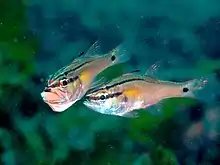石持
Japanese
| Kanji in this term | |
|---|---|
| 石 | 持 |
| いし Grade: 1 |
も(ち) Grade: 3 |
| kun’yomi | |
Etymology
Compound of 石 (ishi, “stone”) + 持ち (mochi, “possession, ownership”). Literally, “having stones”, referring to the prominently large otoliths in the croakers' skulls.
Noun
石持 • (ishimochi)

石持、白口 (Pennahia argentata), white croaker for sale in a market

ネンブツダイ、石持(テンジクダイ科)の一つ: Apogon semilineatus, half-lined cardinalfish, a member of family Apogonidae
- 石持ち, 石首魚, 石頭魚: synonym of 白口 (shiroguchi, “silver croaker”)
- (Can we verify(+) this sense?)石持ち, 石首魚, 石頭魚: any cardinalfish in the Apogonidae family
- synonym of カジカ (kajika, “sculpin; Japanese fluvial sculpin”)
- a crosspiece supporting a stone roof
- Synonym: やあら (yāra)
- short for 石持小紋 (ishimochi komon), a pattern used in stencil dying textiles that resembles a pile of small stones
Usage notes
- As with many terms that name organisms, this term is often spelled in katakana, especially in biological contexts (where katakana is customary), as イシモチ.
References
- 1988, 国語大辞典(新装版) (Kokugo Dai Jiten, Revised Edition) (in Japanese), Tōkyō: Shogakukan
This article is issued from Wiktionary. The text is licensed under Creative Commons - Attribution - Sharealike. Additional terms may apply for the media files.